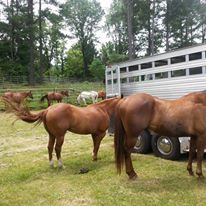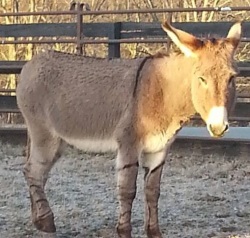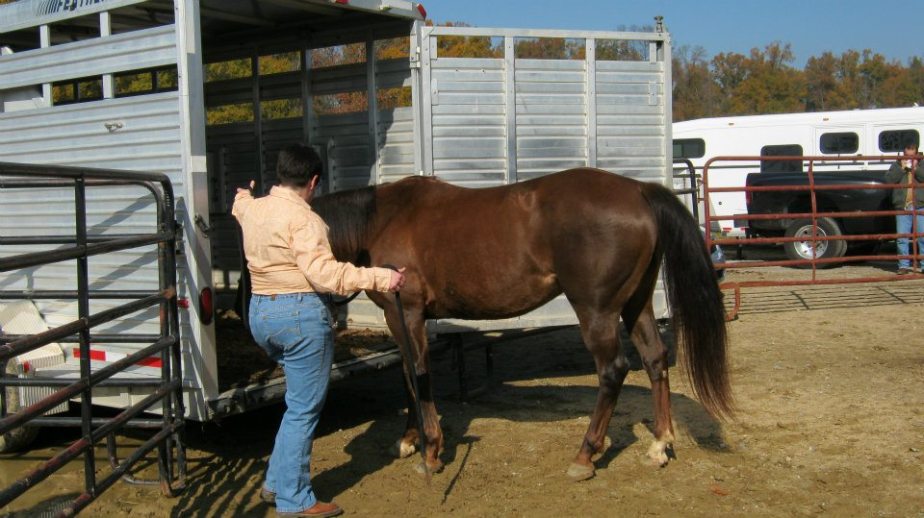As a judge and a competitor that trains my own horses, I’m all too familiar with show nerves in both horses and people. The funny thing about show nerves is that they tend to be a vicious cycle. The more nervous we are, the more the nervous the horse becomes. The more nervous the horse gets, because we’re nervous, the more nervous we get!
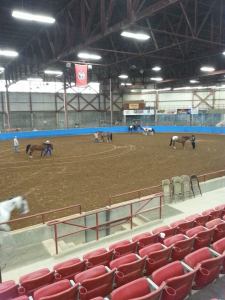
It’s a never-ending cycle! The problem is that someone – whether it’s us or the horse – has to lead. If you’ve got a solid baby sitter type horse that’s been everywhere and done everything you might survive if they lead. However, if you’ve got a horse that’s the least bit green or insecure you had better learn to step up to the plate and be a leader.
Insecure horses, whether they’ve been hauled a lot or not, need a confident rider. They need to feel safe and they look to us to make them feel secure. Only when they feel that security can they start to relax and settle. The first step to improving you and your horse’s show nerves is to recognize their need for confidence, and to recognize your responsibility as a leader. When you realize your role of helping your horse, suddenly you go from being reactive and somewhat of a victim to being more in control. Your mindset tends to change when you see you are responsible for your horse’s frame of mind.
Smarter horses tend to anticipate and get more nervous because of that. The best thing you can do on show day with a horse that anticipates is to not get in a hurry. I get nervous if I feel rushed, and I know they do too. The more relaxed I can be, the more relaxed my horses will be as well.
If I have a horse that anticipates, a high energy horse, or a horse that hasn’t been hauled a lot I try to arrive at the show at least two hours before it starts. I’ll wait a few minutes before I unload, and then wait another thirty minutes before I start tacking my horse up. This gives them a chance to acclimate to their surroundings and relax.
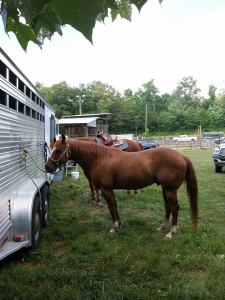
A lot of riders will spend time lunging their horses to work the energy off. While I do think some horses do need to get that energy out of their system, especially those that don’t get a lot of daily turnout, I think the majority of horses would benefit more from just a few minutes of quality ground work that makes them think.
Mindless circles at a crazed canter doesn’t get a horse’s mind. All it does is tire them out, and if you’re showing you need a certain level of energy to compete. Save some of that energy for the show ring by working your horse in a way that makes them think and engage their mind.
As the saying goes, if you get their mind you get their feet. Asking them to move their shoulders and hips, or make a lateral move from the ground goes a long ways towards getting them thinking under saddle.
The same concept goes for warm up under saddle. Lope or canter just enough circles to get the edge off if they need it, but don’t let the goal of your warm up be to tire your horse out. The goal of your warm up should be to get your horse thinking and paying attention to what you’re asking.
Just like on the ground, moves that require them to think are great for making a horse think. Instead of repetitive circles, try frequent changes of directions and rollbacks, a side pass or a half pass to get your horse paying attention. Mix your ride up to keep them guessing what you’re going to do next.
As you’re riding, make sure you’re relaxed. Any time you’re tense, whether you realize it or not, you’re contracting muscles in your body that send a “go forward” cue to your horse. While your hands and legs may be telling your horse to slow down or stop, the rest of your body is telling your horse to move. This conflict in cues can frustrate a horse and cause them to be more nervous. Taking a big deep breath and releasing it loudly will release the tension that you’re feeling as well as relax the muscles, and it sends an audible cue to your horse.
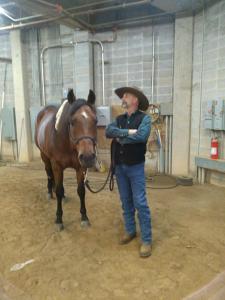
Knowing your role as a competitor, and changing your warm up strategy can improve show day nerves. Take the time to do an honest assessment of you and your horse, and look for ways to improve your preparation and you’ll see results in the show pen.
Do you struggle with being nervous in the show pen? How do you think that impacts your horse? What changes can you make to improve that?
